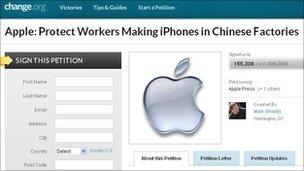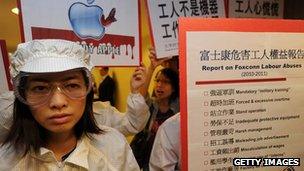Apple petitioners tell firm to protect Chinese workers
- Published

Campaigners say they were motivated to act by media reports about supply workers' conditions
An online petition, signed by 155,000 people, has called on Apple to do more to ensure its Chinese factory workers are treated better.
The campaign,on Change.org, external, follows reports of poor working conditions in factories that make Apple products.
A separateSumOfUs petition, external, with more than 43,000 signatories, calls for the iPhone 5 to be made "ethically".
Apple acknowledged the demands. Its chief executive earlier said it cared about every worker in its supply chain.
The Change petition was organised by Washington-based communications worker Mark Shields.
It calls on Apple to "release a worker protection strategy for new product releases", saying that injuries tend to spike at times when staff are under the most pressure.
'Moral responsibility'
It also praises Apple's commitment to allow the non-profit Fair Labor Association to monitor the suppliers, but urges the company to publish the results with details of where each identified violation occurred.
The SumOfUs movement focuses its efforts on the firm's next major smartphone update.
"Every time a Foxconn worker is killed or disabled making an Apple product, Mr Cook bears personal moral responsibility," wrote Taren Stinebrickner-Kauffman, the campaign's executive director.
"Apple is going to have much bigger longer-term problems than paying a few extra dollars for its products if it loses its lustre with ethical consumers," she added.
The petitions follow a New York Times investigation into working conditions in Chinese factories used by Apple.
An anonymous Apple executive told the paper that the firm just had to say the word to bring about change.
"Suppliers would change everything tomorrow if Apple told them they didn't have another choice," he is quoted as saying.
It prompted acompany-wide email response, externalfrom Apple's chief executive, defending the firm's position.
"Any accident is deeply troubling, and any issue with working conditions is cause for concern," Tim Cook wrote.
"Every year we inspect more factories, raising the bar for our partners and going deeper into the supply chain. As we reported earlier this month, we've made a great deal of progress and improved conditions for hundreds of thousands of workers," he added.
The company also referred the BBC to its most recentSupplier Responsibility Progress Report, external.
The document says that Apple conducted 229 audits throughout its supply chain in 2011. It says that is an 80% increase on 2010, including more than 100 first-time audits.
Suicide attempts

Protesters flagged up alleged abuses at Foxconn's last annual general meeting in 2011
The issue about overseas working conditions hit the headlines two years ago when 137 workers at Apple supplier Wintek in eastern China were injured after they used a poisonous chemical - n-hexane - to clean iPhone screens.
Last year four workers were killed in two separate explosions at factories manufacturing iPads.
Taiwanese factory owner Foxconn, which employs an estimated 1.2 million workers in China, has come in for some of the closest scrutiny, amid claims that at least 18 of its workers have attempted suicide over the past two years.
The New York Timesrecently reported workers' accounts, externalof 20 people being "stuffed" in a three-room apartment and a riot set off by "a dispute over paychecks".
It also noted that Apple's previous audits had turned up cases of under-age workers and staff being paid less than the minimum wage at unspecified locations.
The paper said that Foxconn disputed the accounts of crowded living accommodations and the causes of the riot, and said that it had "never been cited by a customer or government for under-age or overworked employees or toxic exposures".
Apple tends to be singled out because of the huge profits it makes - and many of the other big tech firms outsource manufacturing to Foxconn and other Chinese suppliers.
Despite recent reports, workers in China do not appear to have been dissuaded from applying for jobs at the firms.
China'sCUTV station recently reported, externalthat Foxconn's efforts to recruit an additional 100,000 workers to its Zhengzhou campus attracted long queues of young jobseekers, including staff from one of its Shenzhen plants.
- Published23 February 2011
- Published2 June 2010
- Published21 May 2010